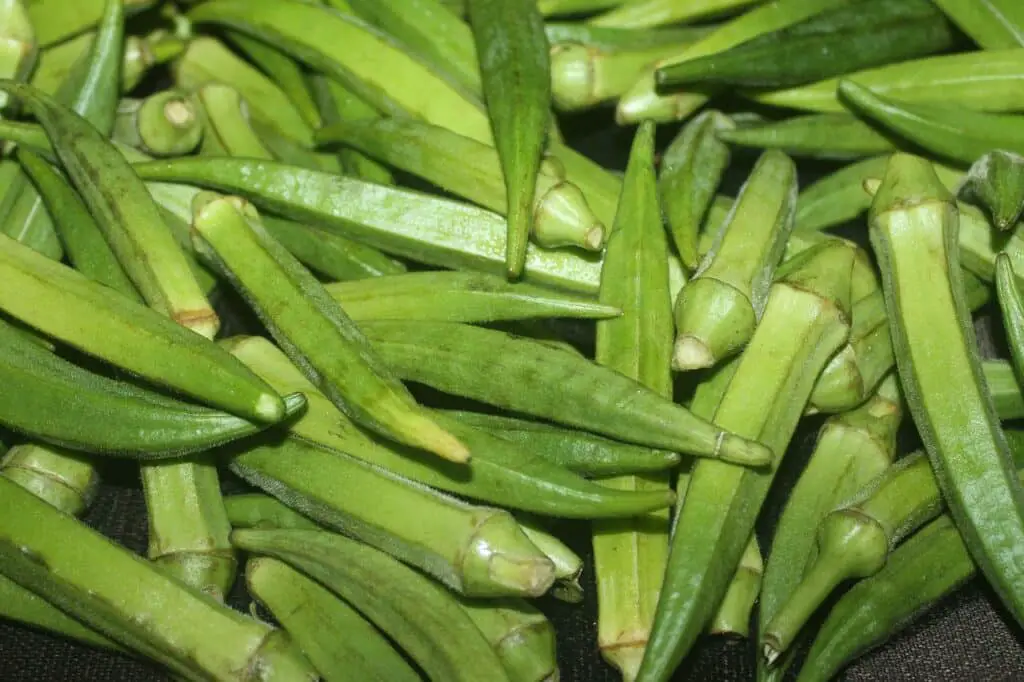Grocery shopping is a task you carry out regularly, and if you are a salad enthusiast, okra cannot miss on your list because of the health benefits.
As you prepare this sweet grassy flavored vegetable, you will wonder if you can give some to your dog.
If this situation always stops you in your tracks, worry not as you are about to indulge in an exhaustive piece about feeding dogs okra.
So, can dogs eat okra?
Yes. Okra is full of proteins, vitamins, and healthy fats, and is extremely low in calories.
Your dog will reap many nutritional benefits from having okra in its diet.
When introducing okra to your dog’s diet, do it in moderation to monitor any stomach upset, or adverse reaction.
This article pulls together essential information on the benefits, risks, tips to follow, and alternatives to okra that you can try to feed your canine friend.

Health benefits of okra to your dog
- Okra is high in vitamins B and C. Vitamin B metabolizes fats and protein, turning them into energy, aids in the maintenance of healthy hair and skin, prevents heart disease and cancer, and strengthens your dog’s immune system.
- Vitamin C will boost your dog’s immune system, reduce body inflammation, and aid in cognitive aging. It also helps produce collagen, which prevents joint diseases and hip dysplasia.
- Okra is high in protein which has essential amino acids that promote muscle growth, tissue repair, and healthy fur and skin in dogs. It will be a good protein supplement for your dog.
- Okra has purge properties because of its mucilage that gets rid of toxic substances by binding cholesterol to it, aiding in treating or preventing constipation in your dog.
- The high antioxidants in okra will help regulate your dog’s blood sugar, and be significant if your dog has diabetes. High antioxidant levels may also aid in preventing cancer.
- Okra contains calcium which facilitates proper bone development in dogs, maintains healthy teeth, and ensures a strong heart and healthy nervous system.
- The folic acid in okra is essential in red blood cell production and DNA synthesis in dogs.
Health concerns of serving okra to your dog.
- Feeding your dog a lot of okra can lead to stomach bloats, vomiting, and diarrhea, signs of gastrointestinal issues. Too much fiber in okra leads to the above symptoms when your dog ingests it consecutively over a long period.
- Your dog can be allergic to okra, so it is crucial to keep a close eye when feeding it for the first time. A food allergic reaction in dogs includes frequent itching of the skin and gastrointestinal upset that causes decreased energy, lack of appetite, diarrhea, and vomiting.
- Feeding your dog pickled okra will be detrimental to its health. The pickling process involves the addition of spices, garlic, and onion which are not safe for your dog’s health. Avoid pickled okra at all costs.
- Unwashed okra can severely harm your dog because of the pesticides found on it. Ensure you wash the okra thoroughly before feeding your dog.

How to prepare okra for your dog
- Step 1: Thoroughly was the okra to get rid of dirt and chemicals.
- Step 2: Drain it well, cut off and discard the stems. Put them on a chopping board and cut them into coins.
- Step 3: Place the okra in a saucepan and add enough water to cover it; bring the water to a boil.
- Step 4: Cook for 8 to 10 minutes until the okra is tender.
- Step 5: Drain well and add it to your dog’s meal when it’s done.
Can dogs eat raw okra?
Yes.
Raw okra is perfectly safe for your dogs.
You can give a few raw slices of the okra to your dog for it to happily crunch away.
Raw okra is ideal as it doesn’t contain additives such as salt, onion, garlic, and spices.
You only have to ensure the okra is thoroughly cleaned before feeding it to your fur friend.
How much okra can my dog have?
Too much of anything is not a good idea.
Start with once a week when introducing okra to your dog’s diet.
Monitor your dog for any allergic reactions and if it loves it, increase the frequency to twice a week.
Don’t feed your dog okra two days in a row.
Remember, okra is meant to supplement your dog’s diet and not be a nutrient source on its own.
Mix it with the dog’s other meals to ensure a balanced diet or feed the okra as a snack.
Tips to consider when feeding your dog okra
- Moderation is key. Too much okra in your dog’s diet can lead to stomach upset and dehydration which will be uncomfortable.
- Don’t add flavor-enhancing ingredients like garlic, onions, and salt to your dog’s okra.
- Don’t feed your dog fried or heavily butter dojra. The high saturated fats will lead to obesity and heart diseases.
- Keep a close eye on your dog after feeding him okra to observe any signs of an allergic reaction. If it occurs or if your dog has a choking incident, call your vet immediately.
Alternatives to okra for dogs
- Asparagus – Is full of essential nutrients, antioxidants, and fiber which will ensure a healthy gut and boost your dog’s immune system.
- Celery – It has anti-inflammatory properties, which aid in preventing arthritis in dogs. Celery is also a good source of fiber and essential vitamins.
- Cucumbers – Cucumbers are 96% water, making them an excellent hydrating treat for dogs. Cucumbers are also low in calories, making them a good fit for dogs trying to lose weight.
Frequently asked questions (FAQs)
Can dogs eat okra seeds?
Yes, dogs can eat okra seeds.
Your dog can find the seeds slimy and the texture off-putting, rejecting the okra, but this should not be a problem as dogs are picky eaters.
Should dogs have a lot of vegetables in their diet?
No.
Dogs shouldn’t have a lot of vegetables in their diet as they can be hard on their digestive tract due to the high fiber content.
Moderation is vital when it comes to vegetables.
Conclusion
As part of your dog’s diet, okra will add a lot of nutritional benefits.
Add it in moderation, and continuously monitor your dog when feeding it okra for any reaction signs.
If you were wondering if you could share your okra with your dog, go ahead and do it!
- What Dog Breeds Have Pink Skin? - March 24, 2023
- What Are the Most Inspiring Dog Breeding Quotes? - March 20, 2023
- Can Pheromone Spray Help Improve Dog Breeding Results? - March 19, 2023








